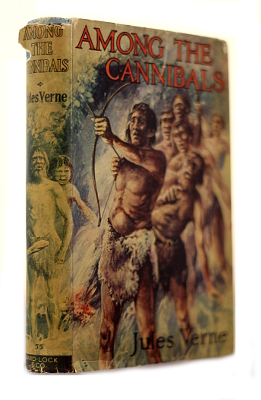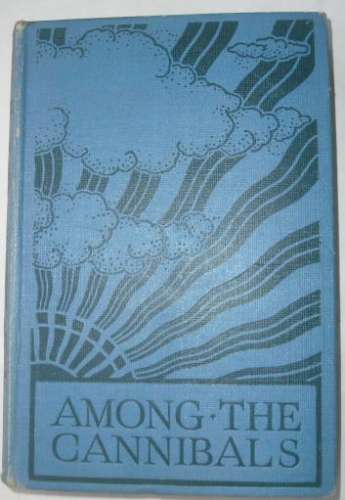Title: Among the Cannibals
Author: Jules Verne
Publisher: Ward, Lock & Co. “The Royal Series”. No date, most probably 1920s.
Condition: Small decorative blue cloth with dust jacket. Small tears and wear to dust jacket, minor foxing to dust jacket and fly pages. Text clean. Editions with the dust jacket are very hard to find.
About the book (from Julesverne.ca):
The contents of a shark’s stomach contains a bottle that holds notes written in three different languages. Much of the notes are indecipherable; however, together they may reveal the location of the whereabouts of Captain Harry Grant, whose ship the Britannia was lost over two years ago. While the latitude of Grant is known from the note, the longitude is a mystery. Clues from the notes point to the South American coast as the probable location of the shipwreck. Lord Glenarvan makes it his quest to find Grant; together with his wife, Harry Grant’s children (Mary and Robert) and the crew of his yacht the Duncan they set off on the chase. An unexpected passenger in the form of French geographer Jacques Paganel joins the search.
The search takes them where the 37th degree of south latitude crosses the South American continent. Crossing the continent from west to east, they travel through Chile and Argentina (Patagonia), with no luck, when Paganel realizes that part of the clue must actually mean Australia. So they go to where the 37th degree begins crossing Australia, there by chance they meet a man who claims his name is Thomas Ayrton, former quartermaster of the Britannia. Ayrton takes them across the Australian continent, with plans of his own to seize control of the Duncan. Ayrton’s treachery makes the party believe that he has gained control of the Duncan. Dejected that their search of Australia did not turn up Captain Grant, the adventurers travel to New Zealand via a ship that barely seems sea-worthy. The vessel wrecks along the New Zealand coast. The party’s attempt to get to Auckland gets them captured by the Maoris, a tribe of cannibals at war with the English and disinterested in keeping the prisoners alive.
About Jules Verne (from Wikipedia):
Jules Gabriel Verne (8 February 1828 – 24 March 1905) was a French novelist, poet, and playwright best known for his adventure novels and his profound influence on the literary genre of science fiction.
Verne was born to bourgeois parents in the seaport of Nantes, where he was trained to follow in his father’s footsteps as a lawyer, but quit the profession early in life to write for magazines and the stage. His collaboration with the publisher Pierre-Jules Hetzel led to the creation of the Voyages Extraordinaires, a widely popular series of scrupulously researched adventure novels including Journey to the Center of the Earth, Twenty Thousand Leagues Under the Sea, and Around the World in Eighty Days.
Verne is generally considered a major literary author in France and most of Europe, where he has had a wide influence on the literary avant-garde and on surrealism. His reputation is markedly different in Anglophone regions, where he has often been labeled a writer of genre fiction or children’s books, not least because of the highly abridged and altered translations in which his novels are often reprinted.
Verne is the second most-translated author in the world since 1979, between the English-language writers Agatha Christie and William Shakespeare, and probably was the most-translated during the 1960s and 1970s. He is one of the authors sometimes called “The Father of Science Fiction”, as are H. G. Wells and Hugo Gernsback.



